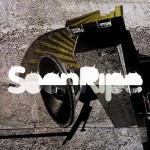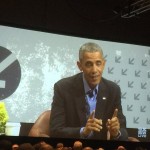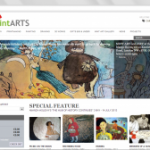For the second year running, the university where I (mostly) work has been host to Mozilla’s annual Festival. Mozilla hires the entire building – all nine floors of it – and fills it with the international luminaries of the open Web, who beaver away on a giant hackfest, key results of which can be seen here. This year, MIT Media Lab Director Joi Ito was a keynote star, amongst a list of speakers and workshop leaders too numerous and amazing to go into in detail here. In fact, the sheer volume of stuff going on over the extended weekend was overwhelming, leading participants to wish the event was at least twice as long, so you could get involved with more of the sessions.
Highlights for me, apart from the keynotes, were as follows.
A session with Mind Candy‘s excellent Mark Baker, creating a game using the Crafty.js game production Javascript library with a group of complete strangers, including Simon Hill (who I have subsequently learned is the presenter of Mind Candy’s Moshi TV). The name of this magnum opus was (ahem) Ebony Lizard Fighter. Great fun, but made me realise how much more there is to learn about Javascript…
A session learning about the Open Badges system. I’ve been interested in this since coming across it at last year’s Mozilla Festival, and have wanted to implement badging at some level in the Web Media course since then. But I couldn’t quite get my head around how it worked. With this session, and a little more research, I’ve mostly figured it out. You can see my first initial results on the bottom right-hand corner of this blog. We hope to roll out a pilot badging scheme for Web Media in January 2013.
My colleague, Evan Raskob, and I were totally blown away by the BananaBread demo during the Friday science fair. This is a fully working first person shooter (FPS) with a bunch of levels to play, entirely rendered using WebGL. So it loads and plays directly within the browser. It’s unbelievably smooth, considering that it’s your browser rendering this and not a proprietary games engine. Right now, it’s optimised for desktop browsers, but the potential to provide FPS games that work on any device – including smartphones and tablets – is immense.
Projects based on Popcorn.js were everywhere, with one particularly interesting implementation being Linklib, developed by Simon Klose and Hampus Soderstrom. This synchronises useful links alongside video, and is eventually intended to send these to a mobile device such as a phone or tablet, so they can be perused whilst you watch. Interestingly, Klose is also making a documentary about The Pirate Bay, which is seeking funding via the crowd-sourced financing site Kickstarter. Popcorn.js is an amazing library that allows you to cue up events on your Web page to coincide with predefined time points in an audio or video file, including activities like loading Wikipedia entries or locations in Google Maps. It’s pretty amazing technology and has great potential for our multi-screening, attention-deficit afflicted audiovisual lives in the 21st century (keep an eye on my book project The End of TV for more on this).
Finally, I enjoyed meeting MinecraftEdu, who are trying to leverage the incredibly successful game Minecraft for educational purposes. It’s a similarly curious idea to the frequent talk about using Second Life in education, but at least this is a virtual environment kids of a certain age actively want to engage with. Both my kids are crazy about it, and the kids at the Mozilla Festival were having a great time building their own private virtual world.
These were just some of the moments that particularly stuck in my memory. I could give you more if you’ve got time to read a blog post with proportions that would be more appropriate to a work of 19th century Russian literature…
Related Posts










And it was such a pleasure having your students involved in Mozfest! I was proud of the @MozStories team for winning the coveted trophy for “Most Tweets” at the festival. http://blog.tinkercad.com/2012/11/17/mozfest-madness-academy-much-more/
Mozilla Festival + Ravensbourne = match made in heaven. Thanks again for all the help to make this work! And for being brave with all these code experiments. I think I might add an open badges sidebar to my blog, too…
I bet you have a few more badges than me! Half mine were assigned by me to myself… so far! I really hope we can help you out next year to move on to even bigger and better things!